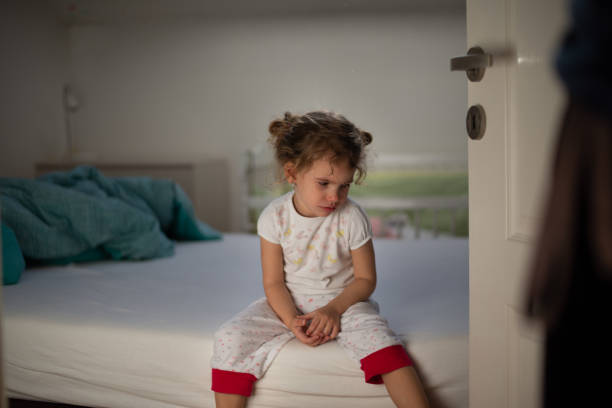Top 10 Reasons That Make 18-Month-Old Toddlers Sad

Are you parenting an 18-month-old toddler? How is the journey so far? You need a break.
Parenting is an extreme sport that leaves you drained. Are you wishing that you could travel to a secluded place? Do you feel like letting out a scream, weeping to sleep, and returning to your toddler(s)? You are not alone, many other parents have shared a similar opinion.
One of the biggest parenting challenges your 18-24-month-old toddler(s) will subject you to is their intense emotions. One minute, they are bubbly; the next, their anger boils to the ceiling. Now, let us look at 10 reasons that make 18-month-old toddlers sad.
Top 10 Causes of Sadness in 18-Month-Old Toddlers
1. Can’t Get What They Want

If your 18-month-old toddler wants a toy but you can’t get it for them, they will wail and throw tantrums.
Toddlers between 16 and 24 months old also get sad when they fail to achieve something they want.
They could be too short to pick an item placed above, or the item could be too far. They could also see a toy on the TV and WANT it. What happens in these cases? The toddler gets sad.
Explain to the toddler in the simplest terms possible why they cannot get some things they want.
2. Bedtime

Another thing that makes 18-month-old toddlers sad is getting them to sleep. As a parent, you know what is best for your child, but to them, you are annoying. No matter how you explain to the toddler, they always view you as a distraction.
The same way you get annoyed when your favorite program is cut short is how toddlers feel when you tell them to sleep. According to them, they should stay awake all through, regardless of whether they are dozing off on the couch.
3. When Told to Share

Humans are innately selfish, and toddlers are not exempted from this trait.
As toddlers grow, they prefer keeping all toys and snacks to themselves.
Any attempt to make 18-month-old toddlers share with their friends is met with sulking and sobs. In some cases, the toddler may throw tantrums.
Your toddler is learning, and you should guide them accordingly. Encourage your toddler to have empathy, understand the importance of being fair, and how to practice turn-taking. Be gentle while at it, and you will find them sharing toys easily.
4. Not Sure Whether to Be a Big Kid or a Baby

Toddlers aged between 16 and 24 months suffer from a serious identity crisis. They are struggling to understand who they truly are.
At some point, these toddlers may feel like babies who need a lot of pampering, rocking, and spoon-feeding.
Your toddler can also feel like a big baby who can perform basic chores independently.
The rollercoaster of these emotions leaves the toddler confused and sad.
Always stand by your baby, reassuring them of your support when they need it dearly.
5. Changes in Routine

How does it feel when someone changes your routine abruptly? For instance, someone tells you to sleep for only four hours, yet you are used to sleeping for 7 hours. You would be mad at them.
The feeling is similar to what 18-month-old toddlers get when you interrupt their schedules. For example, they could be used to playing for more than 7 hours every day. Then, out of the blue, you cap the playing time to two hours. A change in routine makes toddlers sad.
If your schedule was adjusted, you would protest and probably question the decision. What about an 18-month-old toddler? Since they cannot express themselves fluently, they will only sulk and withdraw from your affection.
The best way to change a toddler’s routine is by introducing it slowly until their mind and bodies adjust. With time, they will be following that routine unsupervised.
6. Being Asked to Sit Still

Have you observed how babies between 12 and 24 months are hyperactive? Jumping from one place to another like Spiderman, making noise all over the place, and calling your name after every minute?
Why would you spoil their party by telling them to stay still? And even stop the noise? Telling your baby to remain calm or silent leaves them without any other fun activity and makes them sad.
Research has also established that most toddlers are super active at this age.
Unless your baby has been diagnosed with attention deficit hyperactivity disorder (ADHD), you should not interfere with their activities.
Instead of telling the toddler to remain still, distract them with another fun activity. You can introduce toys or play with them outdoors.
7. Leaving the Park

Babies aged between 16 and 24 months assume that every day, every second, is a holiday in the amusement park. In their mind, the party should never stop, and they should be allowed to play for as much as they can.
When you tell them to go home, they get furious at you. The biggest mistake you can make when they are in this state is teasing them. You are the bigger person and should handle a toddler’s disappointment with extreme care.
Sulking in toddlers is a common trait of dissatisfaction.
Be gentle but firm when telling the toddler it is about to leave the park. Tell the toddler the importance of taking a break and that you will get back another time.
8. Getting in and Out of the Bath

Babies under two years have a unique pattern as far as bathing is concerned. Undressing the toddler for a makes them cry, sulk, and even run away.
Funnily, once the baby gets used to the water temperature, you cannot get them out. You can, but not without a fight. Every time you attempt to get them out of water, they scream their lungs out, almost cussing.
Demonstrate to the toddler that bathing is fun. Immerse your hand in the water and pretend to splash it before bathing them. Once you have bathed them, show them how to use the towel. With time, the toddler will find the bathing process as a fun-filled activity and not a chore.
9. Being Told No

Babies push our sanity to extreme levels. They will get on top of tables, smash electronics, and pour liquids everywhere. The moment you tell them NO, all hell breaks loose.
Why do babies cry when you tell them no? The main reason why babies cry when you tell them NO is because they want to get away with everything. Toddlers are great observers, and when you give in to their tantrums once, it becomes a routine.
Observe the toddler’s behaviour, especially when they need you to grant them a favour.
If the toddler throws tantrums when you say NO, set strict boundaries.
If your toddler cries after you have told them NO, withdraw certain favors.
10. Diaper Changes

The final reason why 18-month-toddlers get sad is during diaper changes.
No matter how wet or soiled a toddler’s diaper is, they will always cling to them.
As a parent, prepare to deal with toddlers crying during diaper changes. If possible, potty train them to avoid the drama that comes with diaper changes.
Bottom Line
Now that you have known the 10 possible reasons that make 18-month-old toddlers sad and the solutions, apply them. When handling sad babies, be gentle. Unlike adults and bigger toddlers who can easily handle criticism, babies need pampering. As the toddler grows, they will also outgrow the fussiness.



